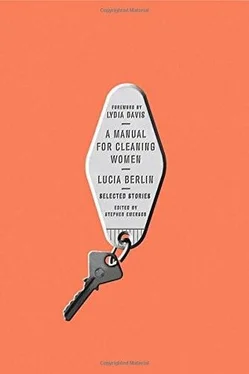She writes about her sons — she had four — and the jobs she worked to support them, often on her own. Or, we should say, she writes about a woman with four sons, jobs like her jobs — cleaning woman, ER nurse, hospital ward clerk, hospital switchboard operator, teacher.
She lived in so many places, experienced so much — it was enough to fill several lives. We have, most of us, known at least some part of what she went through: children in trouble, or early molestation, or a rapturous love affair, struggles with addiction, a difficult illness or disability, an unexpected bond with a sibling, or a tedious job, difficult fellow workers, a demanding boss, or a deceitful friend, not to speak of awe in the presence of the natural world — Hereford cattle knee deep in Indian paintbrush, a field of bluebonnets, a pink rocket flower growing in the alley behind a hospital. Because we have known some part of it, or something like it, we are right there with her as she takes us through it.
* * *
Things actually happen in the stories — a whole mouthful of teeth gets pulled at once; a little girl gets expelled from school for striking a nun; an old man dies in a mountaintop cabin, his goats and his dog in bed with him; the history teacher with her mildewed sweater is dismissed for being a Communist—“That’s all it took. Three words to my father. She was fired sometime that weekend and we never saw her again.”
Is this why it is almost impossible to stop reading a story of Lucia Berlin’s once you begin? Is it because things keep happening? Is it also the narrating voice, so engaging, so companionable? Along with the economy, the pacing, the imagery, the clarity? These stories make you forget what you were doing, where you are, even who you are.
“Wait,” begins one story. “Let me explain…” It is a voice close to Lucia’s own, though never identical. Her wit and her irony flow through the stories and overflow in her letters, too: “She is taking her medication,” she told me once, in 2002, about a friend, “which makes a big difference! What did people do before Prozac? Beat up horses I guess.”
Beat up horses. Where did that come from? The past was maybe as alive in her mind as were other cultures, other languages, politics, human foibles; the range of her reference so rich and even exotic that switchboard operators lean into their boards like milkmaids leaning into their cows; or a friend comes to the door, “Her black hair … up in tin rollers, like a kabuki headdress.”
The past — I read this passage from “So Long” a few times, with relish, with wonder, before I realized what she was doing:
One night it was bitterly cold, Ben and Keith were sleeping with me, in snowsuits. The shutters banged in the wind, shutters as old as Herman Melville. It was Sunday so there were no cars. Below in the streets the sailmaker passed, in a horse-drawn cart. Clop clop. Sleet hissed cold against the windows and Max called. Hello, he said. I’m right around the corner in a phone booth.
He came with roses, a bottle of brandy and four tickets to Acapulco. I woke up the boys and we left.
They were living in lower Manhattan, at a time when the heat would be turned off at the end of the working day if you lived in a loft. Maybe the shutters really were as old as Herman Melville, since in some parts of Manhattan buildings did date from the 1860s, back then, more of them than now, though now, too. Though it could be that she is exaggerating again — a beautiful exaggeration, if so, a beautiful flourish. She goes on: “It was Sunday so there were no cars.” That sounded realistic, so, then, I was fooled by the sailmaker and the horse-drawn cart, which came next — I believed it and accepted it, and only realized after another reading that she must have jumped back effortlessly into Melville’s time again. The “Clop clop,” too, is something she likes to do — waste no words, add a detail in note form. The “sleet hissing” took me in there, within those walls, and then the action accelerated and we were suddenly on our way to Acapulco.
This is exhilarating writing.
Another story begins with a typically straightforward and informative statement that I can easily believe is drawn directly from Berlin’s own life: “I’ve worked in hospitals for years now and if there’s one thing I’ve learned it’s that the sicker the patients are the less noise they make. That’s why I ignore the patient intercom.” Reading that, I’m reminded of the stories of William Carlos Williams when he wrote as the family doctor he was — his directness, his frank and knowledgeable details of medical conditions and treatment, his objective reporting. Even more than Williams, she also saw Chekhov (another doctor) as a model and teacher. In fact, she says in a letter to Stephen Emerson that what gives life to their work is their physician’s detachment, combined with compassion. She goes on to mention their use of specific detail and their economy—“No words are written that aren’t necessary.” Detachment, compassion, specific detail, and economy — and we are well on the way to identifying some of the most important things in good writing. But there is always a little more to say.
* * *
How does she do it? It’s that we never know quite what is going to come next. Nothing is predictable. And yet everything is also natural, true to life, true to our expectations of psychology and emotion.
At the end of “Dr. H. A. Moynihan,” the mother seems to soften a bit toward her drunk and mean, bigoted old father: “‘He did a good job,’ my mother said.” This is the tail end of the story, and so we think — having been trained by all our years of reading stories — that now the mother will relent, people in troubled families can be reconciled, at least for a while. But when the daughter asks, “‘You don’t still hate him, do you Mama?’” the answer, brutally honest, and in some way satisfying, is: “‘Oh yes … Yes I do.’”
Berlin is unflinching, pulls no punches, and yet the brutality of life is always tempered by her compassion for human frailty, the wit and intelligence of that narrating voice, and her gentle humor.
In a story called “Silence,” the narrator says: “I don’t mind telling people awful things if I can make them funny.” (Though some things, she adds, just weren’t funny.)
Sometimes the comedy is broad, as in “Sex Appeal,” where the pretty cousin Bella Lynn sets off in an airplane toward what she hopes will be a Hollywood career, her bust enhanced by an inflatable bra — but when the airplane reaches cruising altitude, the bra explodes.
Usually the humor is more understated, a natural part of the narrative conversation — for instance, about the difficulty of buying alcoholic beverages in Boulder: “The liquor stores are gigantic Target-size nightmares. You could die from DTs just trying to find the Jim Beam aisle.” She goes on to inform us that “the best town is Albuquerque where the liquor stores have drive-through windows, so you don’t even have to get out of your pajamas.”
As in life, comedy can occur in the midst of tragedy: the younger sister, dying of cancer, wails, “I’ll never see donkeys again!” and both sisters eventually laugh and laugh, but the poignant exclamation stays with you. Death has become so immediate — no more donkeys, no more of so many things.
* * *
Did she learn her fantastic ability to tell a story from the storytellers she grew up with? Or was she always attracted to storytellers, did she seek them out, learn from them? Both, no doubt. She had a natural feel for the form, the structure of a story. Natural? What I mean is that a story of hers has a balanced, solid structure and yet moves with such an illusion of naturalness from one subject to another, or, in some stories, from present into past — even within a sentence, as in the following:
Читать дальше












